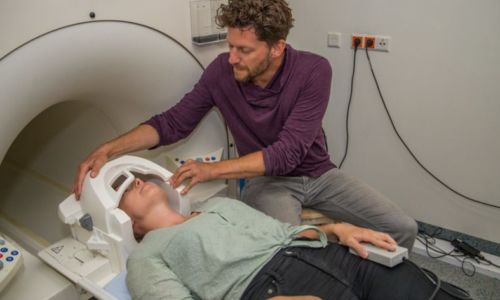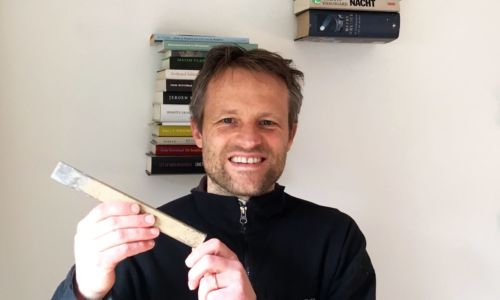The importance of ERC grants: continue as assistant professor, or become a high school teacher
-
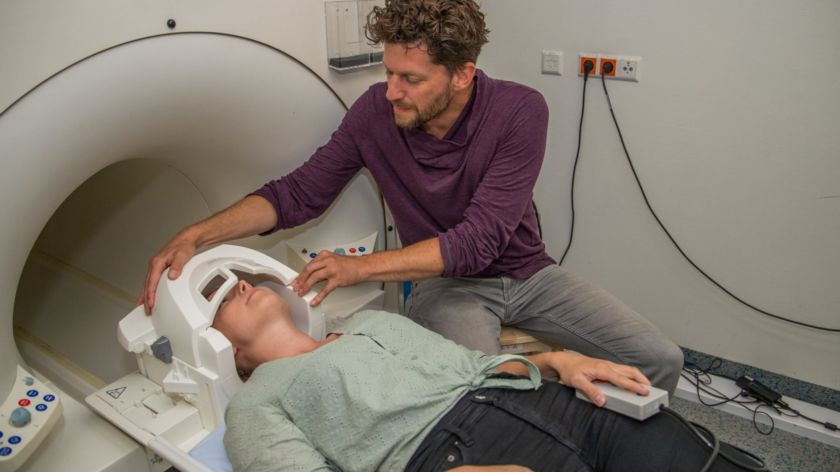 Sebo Uithol is preparing for an MRI-experiment. Photo: Tom Hessels
Sebo Uithol is preparing for an MRI-experiment. Photo: Tom Hessels
It will be all or nothing. This month the result of an important European grant application will determine the fate of neuroscientist Sebo Uithol. Vox followed the Radboud University’s Donders Institute researcher and the university machine that supported him during the months of preparation that he put into his grant application. ‘This grant is the stepping stone towards a permanent job, there are almost no alternatives.’
Wednesday, 26 June — half past one in the afternoon. In a small room in the Covent Garden Building, a rectangular steel office block covered with glass panels in the centre of Brussels, four women and one man are trying to control their nerves. They are all about to be subjected to a thirty-minute interview, quite possibly the most important interview in their career. This is certainly the case for Sebo Uithol, a brain researcher at Radboud University’s Donders Institute for Cognition.
At exactly a quarter to two a door opens. ‘Doctor Uithol?’ The hostess is smiling. Sebo gets up, closes the top button of his navy bespoke suit, made especially for the occasion. He clears his throat, before he enters the ten-meter long meeting room. This is it. Right now he has to convince a seventeen-member selection committee that his research plans for the next five years deserve a prestigious European grant of 1.5 million euros. ‘Welcome, thank you for being here,’ the chairman of the committee says, pen and notepad ready. ‘Let’s get started.’
Make or break
Every year, the European Research Council (ERC) distributes around four hundred Starting Grants to researchers from 32 European countries. The grant allows ‘young’ scientists (who have obtained their PhD two to seven years earlier) to start their own research group. A make or break moment in their careers. If they are able to obtain such a grant, it proves they can stand on their own two feet as researchers and the road to a professorship opens up. If they don’t, their scientific career is in danger of being nipped in the bud.
The academic world is hyper-competitive. This makes the battle for the Starting Grants a dog eat dog competition. In 2018, Dutch researchers managed to obtain 246 grants out of a total of 3,123 European applications – so the chance of success of less than 8 percent. Radboud University has received only three ERC-grants in the past year.
And don’t think separating the wheat from the chaff is simple, when it comes to these grant applications. Press releases often suggest that researchers receive large grants purely based on their exceptional individual academic qualities. But in reality, many universities have an entire ‘support machine’ in place that guides scientists through the long application process, from the very first research idea, to their presentation in front of the assessment committee, many months later.
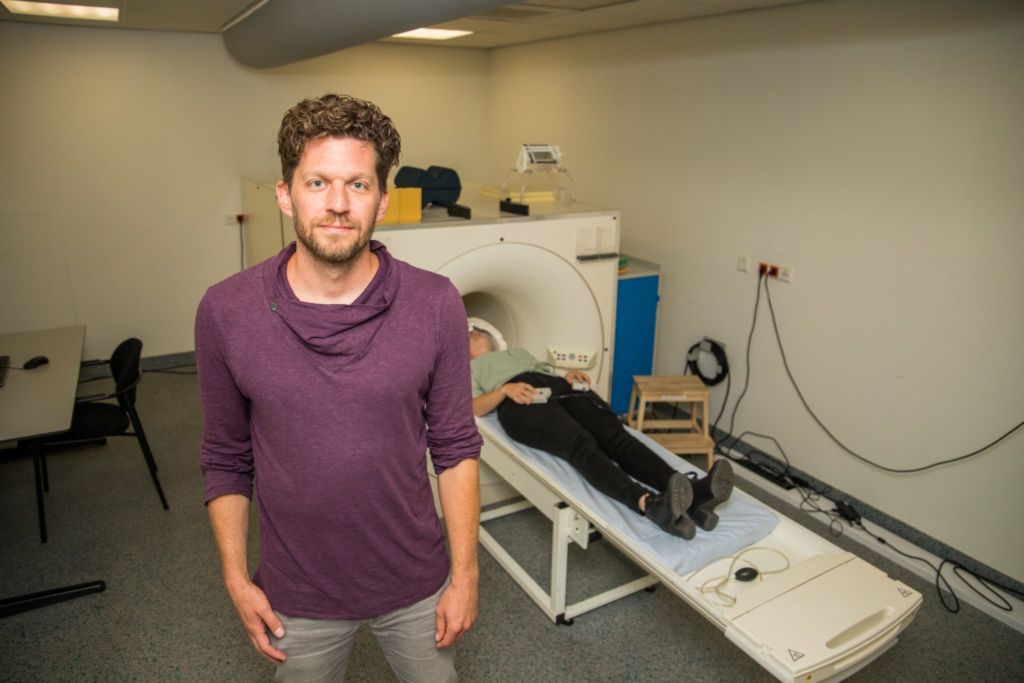
The ERC Starting Grant is crucial for brain researcher Uithol. A flashback to mid-May 2019. Sebo Uithol paces his office in the Donders Institute. He has submitted his proposal in October 2018, and the laureates will be announced in mid-August 2019. ‘Apart from the Vidi [one of the main Dutch grants – ED], this is the one big grant I can still apply for.’, he says. ‘This is a crucial stepping stone for me to a permanent job. There are almost no alternatives, certainly not within neuroscience.’
‘What an ‘oak’ is, is always different for your brain’
Some nights it haunts him: what if he misses out on this grant? The brain scientist is over forty now, which means he is getting too old for research positions like postdoc jobs. Since he obtained his PhD in 2011, Sebo Uithol has worked on temporary postdoc assignments all over the world, from Parma, Italy, and Berlin, Germany to San Diego in the US. But his time for this mode of academic existence is up. So now, it is either up or out.
Our brain
So, what is Uithol’s application all about? That will take more than a couple of minutes to explain, he laughs. He has come up with a new theory about how the brain remembers concepts, such as ‘tree’ or ‘cup’. His theory goes against the grain of current belief among neuroscientists. ‘Many scientists think that concepts are explicitly stored in the brain. Almost as if each concept has its own nerve cell. I don’t think our brain works that way at all. I believe the brain processes involved are different every time, depending on the context in which we use the concepts.’
For example: if you talk to someone about an oak tree, because you want an oak floor in your house, this evokes very different associations then when for instance you talk about a problematic oak processionary caterpillar infestation. In the first case, you probably think of sawing, sanding and plank lengths. In the second case, you probably wonder if a tree with these caterpillars might be in your garden. All these associations together create the concept of ‘oak’, Uithol suspects. ‘What an ‘oak’ is, is therefore always different for your brain.’
‘Philosophers are familiar with such so-called flexible representations,’ he goes on, ‘but they rarely exchange information with neuroscientists. I think maybe they should. Because neuroscientists are the ones who can find experimental evidence for this idea, with their brain scanners.’
Uithol wants to combine these worlds of philosophy and neuroscience. And he believes he has the ideal background for it. In addition to his training as a mechanical engineer at Twente University, he has followed many academic courses on philosophy and cognition. His PhD research was at the intersection of philosophy and theoretical neuroscience. In the past years, he has also gained practical experience with MRI experiments.
‘I worked on it full time for four months’
But how do you ensure that all this expertise pays off — in the form of a large research grant? Uithol takes a thorough approach, leaving nothing to chance. Even before the summer of 2018, he has extensively discussed his ideas with various experienced colleagues, and used their feedback to write several drafts of his proposal. ‘All in all, I think I worked on it full time for three or four months.’ With a sense of understatement, he adds: ‘Quite an investment.’ Not only for himself, but also for the lab where he works. They were missing an employee for all those months.
And Uithol has made good use of the university’s ‘support machine’. Grant advisor Brechje de Ruyck of Radboud Innovation has read his proposal with a critical eye in September 2018, one month before the submission deadline. ‘She was very enthusiastic about it, she only had some small comments’, says Uithol.
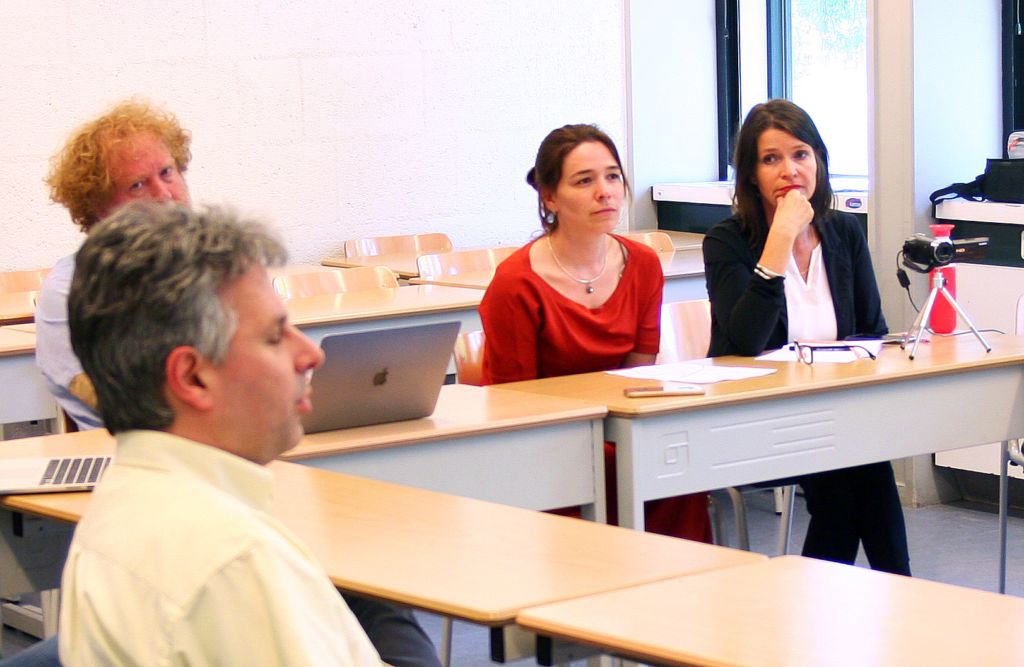
That is certainly not always the case with these proposals, says De Ruyck when Vox speaks to her and her fellow consultant Pieter Jan Boon in mid-June. ‘Sometimes the research objective is unclear, or how applicants think they will achieve it. Or, also not uncommon, the two don’t fit together. We then ask a set of questions, to help researchers get a clearer picture of what it is exactly that they want. Or we ask them to put a schedule on paper.’ ‘Not everyone actually uses our feedback’, Boon acknowledges. ‘This is of course allowed. In the end, it’s their personal proposal.’
At Radboud University, around twenty grant advisors (at central and faculty level) are available to help researchers with their applications. They assist in around 100 applications per year. From individual scholarships such as the Dutch Veni-Vidi-Vici’s and the three ERC grants, to large consortium scholarships. The fact that there is so much support, mirrors how important attracting external research funding is for the university. According to their annual report, external research funding was around 140 million euro in 2018, about a quarter of the university’s total income.
More publications
March 29, 2019, 12.42 a.m. *Ping!*, says Uithol’s email program. A message from Brussels. The subject reads ‘Outcome of the Step 1 evaluation’. The email itself states that his proposal is ‘retained’ for the next round. Does this mean he through, or not? Only upon opening the PDF attachment does Uithol understand the meaning of the message. This text is a lot clearer: ‘We invite you to an interview with the selection committee.’ The tension on his face makes way for a big smile. He made it through the first round! Immediately Uithol messages his wife the good news.
A big hurdle has been taken. More than two-thirds of the applicants are eliminated during this first selection round. Last year, only about fifty of the 171 applicants were invited for an interview within the ERC subgroup Uithol is now competing in, called ‘The Human Mind and its Complexities.’ Of these fifty 22 were eventually awarded a grant. If the situation is comparable this year – the numbers are still a secret – Uithol’s chances of success have grown a lot with this one e-mail, to about 40 percent.
A stable future in neuroscience suddenly seems within reach for Sebo Uithol. A larger research group, supervising young researchers, publishing more articles. And very likely also: a permanent appointment. Ideal timing, now that, after years of wandering, he is settling down in a village in the Achterhoek. There, he and his wife have bought a house two years ago. His two daughters, aged five and seven, attend school there, and his wife works in Zutphen, a stone’s throw away.
‘Maybe I will do something radically different, like becoming a high school math teacher’
Should his grant application fail, Uithol does not intend to pack up and move again. ‘Maybe I will do something radically different,’ he says lightly. ‘Something with big data, or mechanical engineering. Or consulting on how to make homes more sustainable. If necessary, I will become a high school math teacher.’
But make no mistake, he emphasizes, he prefers to remain a researcher. ‘Being a scientist is a wonderful profession. You have the opportunity to contribute to our understanding of what it is to be human. It would be a shame if all the knowledge and experience I accumulated doesn’t pay off.’
Overloaded and weary
He has just under three months to make everything perfect, helped by the university’s support machine, that is now on full steam. Uithol sharpens his presentation skills with trainer Inez Zondag from language and communication agency Radboud In’to Languages. Grant adviser De Ruyck is planning a practice presentation for a committee of Radboud scientists. It must all culminate in an unparalleled presentation in Brussels at the end of June, where he will have to perform on his own.
In the three times that they meet, Zondag does not go easy on Uithol. For years she has been giving presentation training to candidates for all kinds of Dutch and European grants, from NWO’s Veni grant to the ERC Consolidator Grant. She handles dozens of people every year and knows the tricks of the trade.
On May 6 Zondag meets Uithol for the first time. In a rehearsal room on the top floor of Huize Heyendael, the researcher presents the first version of his presentation. ‘My name is Sebo Uithol, and in the next ten minutes I’m going to tell you why we should get rid of the idea that concepts have fixed representations in the brain. Take the term ‘apple’ … ‘, he begins. In the seven minutes and 45 seconds that follow, slides full of arrows, time schedules and lots of text follow. Uithol presents his plan loosely. Hands in pockets, not always easy to understand – it’s all not quite there yet.
That’s also what Zondag thinks. ‘You don’t convince me yet,’ she says. ‘Where I want you to go with me, is to turn a great story into a compelling argument. It must pop. Those committee members are overloaded and weary after listening to chats like yours all day long. You have thirty seconds to try and make friends with them. During this time they try to figure out who they are facing: what does he sound like? Is he confident?’
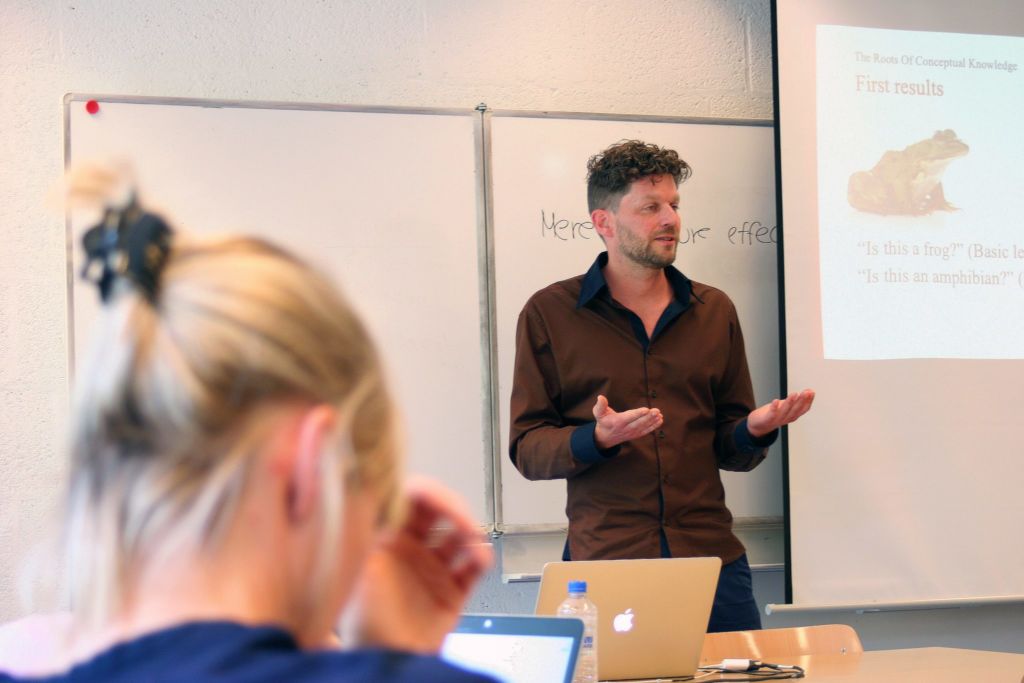
The hands must come out of the pockets. ‘Build in moments of silence’, is her advice, ‘that reinforces the seniority that you already radiate. You have a calm, friendly voice.’ Try to make real contact, she continues, for example by looking at people exactly long enough. Looking at someone too briefly makes them restless, long stares too. ‘A trick that helps is to check what eye colour someone has.’
In terms of content, the trainer also has tips. The example of the apple appeals to her: ‘That’s nice and concrete. Ask yourself if you could bring a real apple.’ Perhaps Uithol can start his presentation with the apple, and only then introduce himself? This will immediately make his audience alert.
She also thinks his presentation is too full and complicated. ‘All those heads full of apples, words, and arrows, people don’t understand that. Keep it simple and be careful with the amount of text. The point is that your message must come across, not the details. Why is it ground-breaking? And why do you have to do this project?’ Put a photo of yourself on the first slide, is her Secret Tip. After all, this will also appear on the printed handouts of the presentation slides the committee members receive. ‘Then they immediately know which face belongs to this project during the follow-up meeting.’
Despite all the comments, Uithol is optimistic when he gets on his bike to ride back to the Donders Institute. ‘This makes me happy,’ he says, ‘It makes me eager to make adjustments right away.’ He doesn’t mind that his carefully prepared presentation was substandard. ‘My ego is not that big. I am particularly pleased that we receive such professional support here at Radboud University. A lot of European institutions don’t offer that. Those researchers won’t get any further than my first version,’ he reasons.
‘All those heads full of apples, words and arrows, people don’t understand that’
Two weeks later his optimism is gone. After his second session with Zondag Uithol is in a big dip. Excessive blinking and swallowing betray his feelings of uncertainty. He stutters, is not sure about his text. ‘It didn’t go well,’ he complains afterwards. ‘I think Inez was also disappointed, she was expecting more.’ That’s right, says Zondag when asked. ‘I think I left him with a bit of a hangover, yes.’ She adds, laughing: ‘But I just thought his story was too vague! I am of course not an expert in his field, but I must be able to understand it conceptually. The committee members also sometimes come from other fields, so they will also lose interest.’
Trash bin
May 29 2019, 2.00 pm, room A01.08 in the Radboud Spinoza building: final rehearsal. Three Radboud University professors and three other senior researchers form a ‘test’ selection committee. They are experts in the fields of philosophy, neuroscience and linguistics, and are all connected to the Donders Institute. Zondag is also there, recording the entire session on video, so it can be assessed afterwards.
The committee puts the fire on Uithol and his proposal. His theoretical ideas are beautiful, but are the experiments he proposes actually suitable?, asks psycholinguist Vitória Piai. And that second subproject, says philosopher Pim Haselager worriedly, isn’t that much too complex for an inexperienced PhD student to tackle? Uithol handles their questions and worries quite well, the committee says afterwards. But he must be careful not to come across overconfident. Neuroscientist Roshan Cools: ‘It almost seems like you want to throw forty years of previous research by your colleagues into the trash bin.’ ‘You don’t have to pretend that you are going to solve everything’, colleague Ivan Toni adds.
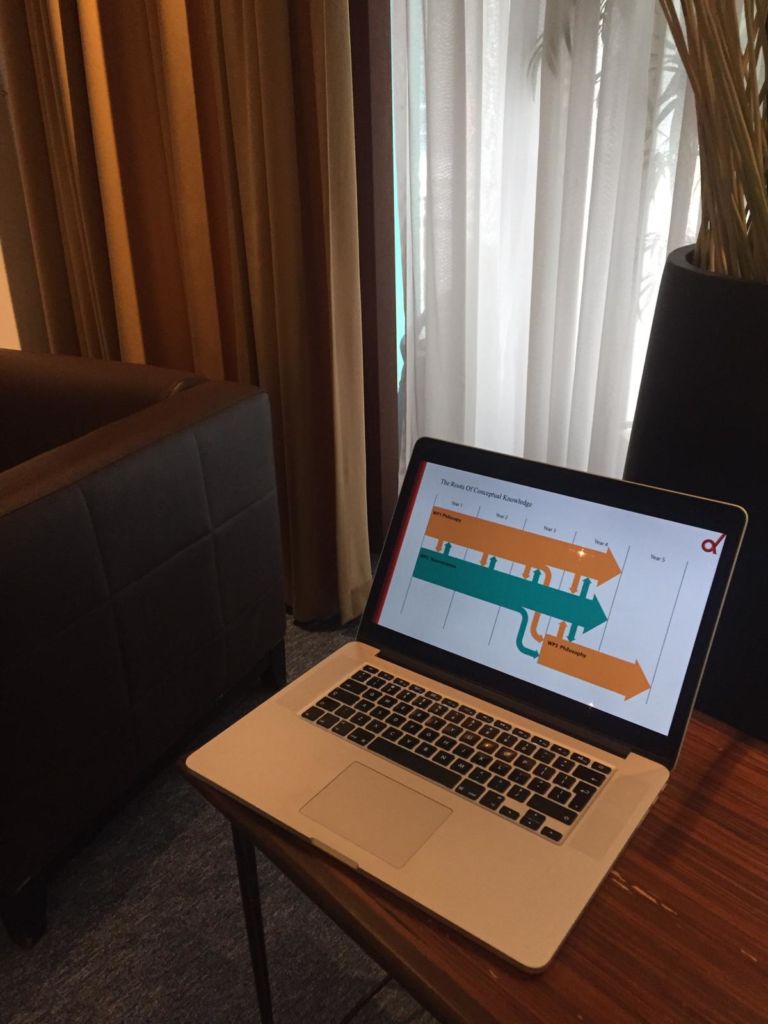
Twenty-seven days later Sebo Uithol checks in at the Siru hotel in Brussels, one day before the ‘real’ presentation. It’s 37 degrees in the shade outside, but inside the neuroscientist is cool as always. ‘I don’t feel any nerves yet. At most I feel a healthy competitive tension.’ His story is now solid. It would still come out smoothly, if he would be hanging upside down from the ceiling of his hotel room.
But at night the nerves do play up. Uithol wakes up in a sweat. His laptop has been stolen! It turns out to be a dream.
The presentation day itself flies by. In the morning, still in his hotel room, Uithol practices his presentation twice before checking out at noon. On the way to the Covent Garden Building, two hundred meters away, he buys a muesli bar and a sandwich. But his adrenalin level is now so high that they remain untouched in his bag.
When the neuroscientist starts his PowerPoint presentation, at 1.45 pm, all his preparation pays off. The presentation is flawless. He stands firm, looks at people the right way. The excessive blinking and swallowing have disappeared. The committee members regularly nod in agreement when he is speaking.
01-behind
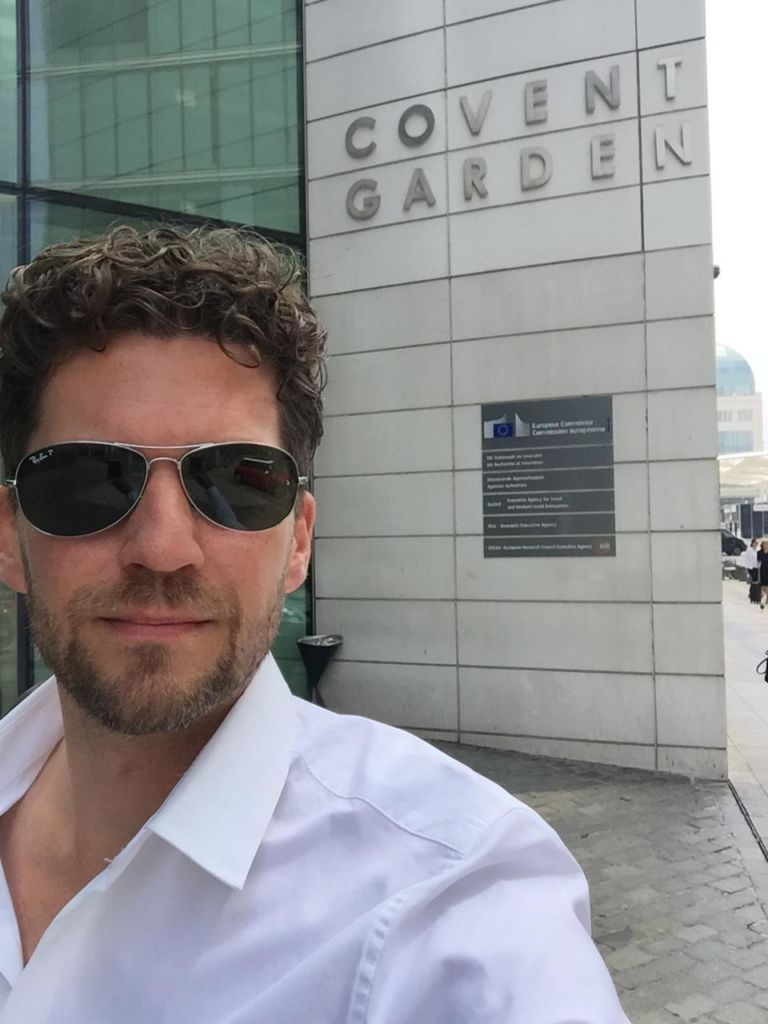
Then the committee starts asking more detailed questions about his project. Uithol was a bit worried about this, because the committee members also have comments in front of them supplied by external assessors, who have critically examined his proposal. Uithol himself does not know what these critiques entail– which feels a bit like being 0-1 behind at the start of the game.
But it soon turns out he actually has a head start. According to the chairman of the committee, the external reviews were excellent. With even more self-confidence, the Radboud University researcher now answers the committee’s questions. He was already expecting some of them, to these he can respond very well – better than the experts themselves expected, is his impression.
This does not mean the race is now run. Uithol fears other candidates may perform even better. ‘Maybe they were able to reply even better to the questions of some committee members.’ He is referring to one of the questioners specifically, a linguist, who’s questions he did not like. ‘She asked why I won’t also investigate how the brain deals with numbers. And why I didn’t quote the research of someone named Kerry – a name I did not know at all – on numbers? A completely irrelevant question!’
Two hours later, Uithol sinks into his train seat, on his way back to the Dutch Achterhoek. He opens a can of Jupiler beer and tries to relax. In the back of his mind, uncertainty about the outcome of his application is gnawing at him. The big wait has begun, here in this Belgian train. It will last until mid-August, when the ERC announces the winners of the grants.
Uithol’s knows his entire career depends on this one result. It is all or nothing now. Or, in his own words, ‘This will make me a professor. Or a high school maths teacher.’
